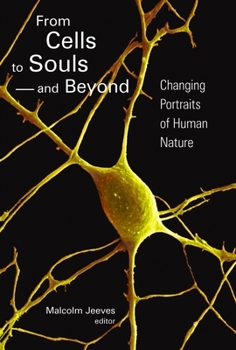From Cells to Souls--And Beyond: Changing Portraits of Human Nature
Select Format
Select Condition 
Book Overview
For more than a decade developments in science have prompted wide-ranging discussions about human nature. Gone are the days when this subject was the preserve of theologians and philosophers; today the fields of genetics and neuroscience are shifting attention to the biological basis of human nature. This engaging book takes readers straight to the intersection of religion and science, exploring what new scientific knowledge does and does not say...
Format:Paperback
Language:English
ISBN:0802809855
ISBN13:9780802809858
Release Date:April 2004
Publisher:William B. Eerdmans Publishing Company
Length:252 Pages
Weight:0.90 lbs.
Dimensions:0.7" x 6.2" x 9.2"
Customer Reviews
1 rating
Making connections, but holding back from the implications
Published by Thriftbooks.com User , 18 years ago
This book is a collection of essays, written from a Christian perspective, which tries to integrate theology with science. There's a chance that I wouldn't have read it if I had known how Christian it is, but I'm glad I did, because in it I found a notion of personhood and soul that resonates well with Buddhism in that it is based on relatedness as the central characteristic of what constitutes a person. The book begins its exploration of what it means to be human from a standard neurological perspective, but quickly moves into the realm religion: "I believe that most, if not all, of the critical properties that have been subsumed within the Judeo-Christian concept of a soul can be captured in the concept of personal relatedness, particularly if one admits the possibility of relatedness to God. In this view, we become persons and "souls" as we experience ourselves within a relational network of God and other human beings. Our soulishness is, thus, established and enriched by our deepest and most significant relationships." I like this conception of soul so much more than what I perceive to be the standard Christian definition, where soul is considered to be eternal and unchanging. What I don't understand, however, is how one can go from a relational definition of soul, which in my mind is the same thing as personhood, and then jump to the idea of relatedness to God. It seems that the only way God can be conceived of in this model is as emerging out of relationship himself, not as the originator of the universe, a being with the characteristics of personhood. It seems like acknowledging that comes too close to unsteadying the very foundation of Christianity, and not one of the authors in this collection wants to get very close to that. For instance, in the next passage, one could very well say the same thing about God, that he only exists as he is related to, which isn't very far from saying he is a being who is made up by people imagining him. At the same time, however, I feel the heart of what is being said, because of the implied necessity of compassion in achieving humanness. "Relatedness can also arise in the state of (and experiences of) being related to by a human community. Our deeply individualist concept of what it means to be human finds it easy to presume that each individual's relatedness is entirely dependent only on that person's capacities. From this limited point of view, my personhood and soulishness would be exclusively dependent on my own ability to relate to others. When we consider the possibilities more thoroughly, we realize that equally important to our experience of interpersonal relatedness is the fact that others relate to us. We both give and receive relatedness." So, in the end, what counts is the effect and not necessarily the consistency of the theology.





